Project 1: Jessica Andrews-Hanna and Joanna Arch Biographies
Project Title: Large-Scale Momentary Experience Sampling and Neurocognitive Mechanisms of Functional and Dysfunctional Prospective Thought
Dr. Jessica Andrews-Hanna is a Research Scientist and Associate in the Institute of Cognitive Science at the University of Colorado Boulder. She received her Ph.D. in Psychology from Harvard University with specialization in cognitive neuroscience and since has completed a National Research Service Award fellowship at the University of Colorado Boulder and received research support from multiple NIH Institutes. Dr. Andrews-Hanna’s program of research seeks insight into the psychological and neural mechanisms underlying self-generated cognition, spanning autobiographical memory, prospection, mentalizing, emotion, and mind-wandering. Across a series of studies bridging cognitive and social neuroscience, she linked these processes to a large-scale brain system known as the “default network.” She also pursues a complementary line of work examining how individuals regulate their internal experience using executive control mechanisms. Her more than 20 publications have appeared in prestigious outlets including Annals of the New York Academy of Science, Neuron, and American Journal of Psychiatry, generating over 5,000 citations to date.
Dr. Joanna Arch is the director of the Anxiety and Health laboratory and Assistant Professor of Psychology and Neuroscience at the University of Colorado Boulder. She received her Ph.D. in Psychology from the University of California Los Angeles with specialization in clinical and health psychology. Her research focuses on the development and evaluation of interventions designed to improve well-being across community and clinical populations. She is actively involved in understanding the biopsychological moderators and mechanisms of positive psychology and related interventions. Her work also assesses the translational potential of basic research on contemplative practice and learning, memory, and cognition, for improving functioning in novel ways. Dr. Arch has directed multiple large, funded intervention studies in high-impact community settings. Her work has resulted in nearly 30 publications in prestigious outlets.
Project 2: Fiery Cushman Biography
Project Title: Social Prospection: A Predictive Coding Model of Mental State Inference
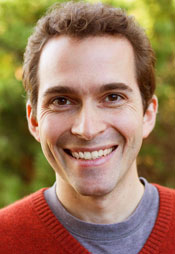 Fiery Cushman is Assistant Professor of Psychology at Harvard University, where he directs the Moral Psychology Research Laboratory. His research investigates the cognitive mechanisms responsible for human moral judgment, along with their development, evolutionary history and neural basis. Much of his research focuses on the role that mental state inference and causal attribution plays in the process of moral judgment. He has also studied the human aversion to harmful action, and recently proposed a novel theoretical model based on the principles of predictive coding in the domain of reward learning.
Fiery Cushman is Assistant Professor of Psychology at Harvard University, where he directs the Moral Psychology Research Laboratory. His research investigates the cognitive mechanisms responsible for human moral judgment, along with their development, evolutionary history and neural basis. Much of his research focuses on the role that mental state inference and causal attribution plays in the process of moral judgment. He has also studied the human aversion to harmful action, and recently proposed a novel theoretical model based on the principles of predictive coding in the domain of reward learning.
His research draws on a wide variety of methods including functional neuroimaging, formal computational modeling, behavioral economics and infant and child development, and has been published in Nature, Proceedings of the National Academy of Science and Psychological Science among other journals. He received his BA and PhD from Harvard University, where he also completed a post-doctoral fellowship. He was Assistant Professor of Cognitive, Linguistic and Psychological Sciences at Brown University from 2011 to 2014.
Project 3: Evelina Fedorenko and Elinor Amit Biographies
Project Title: Neural Correlates of Mental Time Travel: Evaluating the Distinct Modalities of Prospection Hypothesis
 Ev Fedorenko is a cognitive neuroscientist who specializes in the study of the language system and its interfaces with other cognitive systems, in health and disease. She received her Bachelor’s degree in Psychology and Linguistics from Harvard University in 2002. She then proceeded to pursue graduate studies in cognitive science and neuroscience at MIT. After receiving her Ph.D. in 2007, she was awarded a K99/R00 career development grant from NICHD and stayed on as a postdoctoral researcher and then a research scientist in the Kanwisher Lab at MIT. In 2014 she joined the staff at MGH/ Athinoula A. Martinos Center for Biomedical Imaging. Fedorenko’s research interests revolve around the language system. The goals of her research program are: i) to characterize the brain regions that enable us to understand and produce language; ii) to understand the variability in both healthy and cognitively impaired individuals in linguistic processing, including its neural and genetic basis; and iii) to decipher the relationship between the language system and other cognitive systems. With respect to the latter, Fedorenko is especially interested in the role that language plays in abstract thought, including reasoning about hypothetical future events.
Ev Fedorenko is a cognitive neuroscientist who specializes in the study of the language system and its interfaces with other cognitive systems, in health and disease. She received her Bachelor’s degree in Psychology and Linguistics from Harvard University in 2002. She then proceeded to pursue graduate studies in cognitive science and neuroscience at MIT. After receiving her Ph.D. in 2007, she was awarded a K99/R00 career development grant from NICHD and stayed on as a postdoctoral researcher and then a research scientist in the Kanwisher Lab at MIT. In 2014 she joined the staff at MGH/ Athinoula A. Martinos Center for Biomedical Imaging. Fedorenko’s research interests revolve around the language system. The goals of her research program are: i) to characterize the brain regions that enable us to understand and produce language; ii) to understand the variability in both healthy and cognitively impaired individuals in linguistic processing, including its neural and genetic basis; and iii) to decipher the relationship between the language system and other cognitive systems. With respect to the latter, Fedorenko is especially interested in the role that language plays in abstract thought, including reasoning about hypothetical future events.
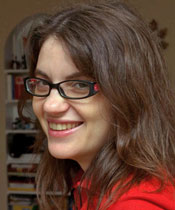 Elinor Amit received her Ph.D. from Tel Aviv University in 2009. Between 2008 and 2010 she worked with one of her Ph.D. advisors, Professor Yaacov Trope, at New York University. In 2010-2012 she pursued postdoctoral research at the Psychology Department at Harvard University, working with Professor Joshua Greene. In the last two years Amit was a College Fellow at the Psychology Department at Harvard. Amit’s research focuses on visual and verbal styles of thoughts. She has shown that people preferentially represent information visually, when the object or event is psychologically proximal to them (temporally, geographically, or socially). By contrast, people preferentially represent information verbally when the object or event is psychologically distal from them. In addition to providing evidence for the association between representational style and psychological distance, Amit’s research aims to explore the downstream implications of this association to social behaviors, such as ethical decision making and moral judgments, interpersonal communication, and self-regulation. Amit’s work was published in high profile journals such as Journal of Experimental Psychology: General, and Psychological Science.
Elinor Amit received her Ph.D. from Tel Aviv University in 2009. Between 2008 and 2010 she worked with one of her Ph.D. advisors, Professor Yaacov Trope, at New York University. In 2010-2012 she pursued postdoctoral research at the Psychology Department at Harvard University, working with Professor Joshua Greene. In the last two years Amit was a College Fellow at the Psychology Department at Harvard. Amit’s research focuses on visual and verbal styles of thoughts. She has shown that people preferentially represent information visually, when the object or event is psychologically proximal to them (temporally, geographically, or socially). By contrast, people preferentially represent information verbally when the object or event is psychologically distal from them. In addition to providing evidence for the association between representational style and psychological distance, Amit’s research aims to explore the downstream implications of this association to social behaviors, such as ethical decision making and moral judgments, interpersonal communication, and self-regulation. Amit’s work was published in high profile journals such as Journal of Experimental Psychology: General, and Psychological Science.
Project 4: Karin Foerde and Daphna Shohamy Biographies
Project Title: A Role for Dopamine in Prospection
Dr. Karin Foerde is a research assistant professor in the Psychology Department at New York University. She received her doctorate in cognitive neuroscience at UCLA where she studied the neural mechanisms supporting flexible vs. habitual learning using fMRI with Russell Poldrack and Barbara Knowlton. She continued her training as a postdoctoral fellow with Daphna Shohamy, Ph.D. in order to examine the contribution of dopamine to multiple forms of learning and memory. She received an individual NRSA fellowship from the National Institute of Neurological Disorders and Stroke in support of this work.
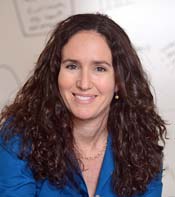 Dr. Daphna Shohamy is an associate professor in the Psychology Department at Columbia University. Daphna received a BA from Tel-Aviv University, double majoring in Psychology and Humanities. She then went on to receive a PhD in Neuroscience from Rutgers University, trained as a postdoc at Stanford University's Psychology Department, and founded the Learning Lab at Columbia in 2007. Research in the Learning lab is focused on how the brain supports learning, memory and decision-making in humans, adopting an integrative approach that combines functional brain imaging (fMRI) with patient and developmental studies. Dr. Shohamy’s work has been recognized with Young Investigator Awards from the Cognitive Neuroscience Society and the Society for Neuroeconomics and the Spence Award for Transformative Early Career Contributions from the Association for Psychological Science.
Dr. Daphna Shohamy is an associate professor in the Psychology Department at Columbia University. Daphna received a BA from Tel-Aviv University, double majoring in Psychology and Humanities. She then went on to receive a PhD in Neuroscience from Rutgers University, trained as a postdoc at Stanford University's Psychology Department, and founded the Learning Lab at Columbia in 2007. Research in the Learning lab is focused on how the brain supports learning, memory and decision-making in humans, adopting an integrative approach that combines functional brain imaging (fMRI) with patient and developmental studies. Dr. Shohamy’s work has been recognized with Young Investigator Awards from the Cognitive Neuroscience Society and the Society for Neuroeconomics and the Spence Award for Transformative Early Career Contributions from the Association for Psychological Science.
Project 5: Simona Ghetti Biography
Project Title: Episodic Prospection in Childhood: Development and Linkages with Achievement
Simona Ghetti received a bachelor of science in psychology from the University of Padua, Italy in 1995, and a PhD in psychology from the University of California, Davis in 2001. She held a researcher position at the National Research Council in Bologna, Italy, from 2002 to 2005 and then returned to the University of California, Davis in 2005 where she is now Professor in the Psychology Department and Center for Mind and Brain. Dr. Ghetti’s research integrates behavioral and neuroimaging methods to examine the development of episodic memory and its implications for learning and decision making.
Although Dr. Ghetti’s work focuses largely on typical development, she has studied atypical memory functioning in children suffering from neurodevelopmental disorders (e.g., ADHD) or medical conditions that affect brain metabolism (e.g., type-1 diabetes). Dr. Ghetti’s work has been continually funded by federal agencies and private foundations, and has been recognized with the Award for Early Contributions to Child Development from the Society for Research in Child Development, the Boyd McCandless Young Scientist Award from Division 7 of the American Psychological Association (APA), and the Award for Distinguished Scientific Early Career Contribution to Developmental Psychology from the APA. Dr. Ghetti’s record of research and service demonstrate her commitment to the promotion of healthy development.
Project 6: Igor Grossmann and Kathleen Vohs Biographies
Project Title: Adaptive Prospection: Wisdom, Intensity Bias, and Forecasting Agency
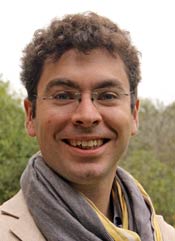 Igor Grossmann is a world traveller: Born in the Soviet Union, he lived in Ukraine, Germany, and the U.S. Upon obtaining a Ph.D. from the University of Michigan, he became an Assistant Professor of Psychology at the University of Waterloo, Canada. His main research goal is to understand the processes that enable individuals to think and act "wisely," for instance by using cognitive strategies that facilitate the resolution of social conflicts, or by adaptively regulating emotions that undermine their goals and compromise their health. To approach these issues, his work targets meaningful real world situations at the intersection of affect and cognition, ranging from daily hassles, to career choices, to romantic and societal conflicts. Grossmann’s work was published in top journals, including the PNAS, Psychological Science, Emotion and Journal of Experimental Psychology. His research on wisdom has been recognized through a Dissertation Award from the American Psychological Association (Division 20), and the Otto Klineberg Intercultural and International Relations Award from The Society for the Psychological Study of Social Issues. He is currently on the editorial boards of the Journal of Personality and Social Psychology and Frontiers in Personality and Social Psychology.
Igor Grossmann is a world traveller: Born in the Soviet Union, he lived in Ukraine, Germany, and the U.S. Upon obtaining a Ph.D. from the University of Michigan, he became an Assistant Professor of Psychology at the University of Waterloo, Canada. His main research goal is to understand the processes that enable individuals to think and act "wisely," for instance by using cognitive strategies that facilitate the resolution of social conflicts, or by adaptively regulating emotions that undermine their goals and compromise their health. To approach these issues, his work targets meaningful real world situations at the intersection of affect and cognition, ranging from daily hassles, to career choices, to romantic and societal conflicts. Grossmann’s work was published in top journals, including the PNAS, Psychological Science, Emotion and Journal of Experimental Psychology. His research on wisdom has been recognized through a Dissertation Award from the American Psychological Association (Division 20), and the Otto Klineberg Intercultural and International Relations Award from The Society for the Psychological Study of Social Issues. He is currently on the editorial boards of the Journal of Personality and Social Psychology and Frontiers in Personality and Social Psychology.
 Kathleen Vohs is the Land O'Lakes Professor of Excellence in Marketing at the University of Minnesota's Carlson School of Management. She was awarded a Ph.D. by Dartmouth College in 2000 and was assistant professor at University of British Columbia. She has authored more than 150 scholarly publications and co-edited 8 books. She won a SAGE Young Scholar Award (2008) the International Society for Self and Identity Outstanding Early Career Award (2009). She has held named chairs at every school and level in her career: UBC awarded her the Canada Research Chair in Marketing Science and Consumer Psychology; UMN named her McKnight Land-Grant Professor and McKnight Presidential Fellow, the most prestigious university-wide awards given to junior and mid-level scholars. In 2012, Vohs was given an Honorary Chair in Consumer Research at Groningen University, Holland. She won a Free Will Essay Prize from the John Templeton Foundation (2013). In 2014, she was awarded the Anneliese Maier Research Award by Germany’s Humboldt Foundation, in a competition across the sciences, humanities, law, and economics. Recently Vohs was named one of the world’s most outstanding business school professors under 40. Her work on decision fatigue reportedly has changed President Obama's daily routine (Michael Lewis, 2012).
Kathleen Vohs is the Land O'Lakes Professor of Excellence in Marketing at the University of Minnesota's Carlson School of Management. She was awarded a Ph.D. by Dartmouth College in 2000 and was assistant professor at University of British Columbia. She has authored more than 150 scholarly publications and co-edited 8 books. She won a SAGE Young Scholar Award (2008) the International Society for Self and Identity Outstanding Early Career Award (2009). She has held named chairs at every school and level in her career: UBC awarded her the Canada Research Chair in Marketing Science and Consumer Psychology; UMN named her McKnight Land-Grant Professor and McKnight Presidential Fellow, the most prestigious university-wide awards given to junior and mid-level scholars. In 2012, Vohs was given an Honorary Chair in Consumer Research at Groningen University, Holland. She won a Free Will Essay Prize from the John Templeton Foundation (2013). In 2014, she was awarded the Anneliese Maier Research Award by Germany’s Humboldt Foundation, in a competition across the sciences, humanities, law, and economics. Recently Vohs was named one of the world’s most outstanding business school professors under 40. Her work on decision fatigue reportedly has changed President Obama's daily routine (Michael Lewis, 2012).
Project 7: Benjamin Hayden Biography
Project Title: Future-Oriented Decisions in Macaques
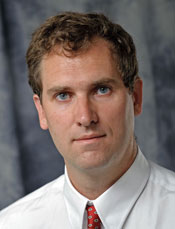 Ben Hayden received his Ph.D. in Molecular and Cell Biology work with Jack Gallant at the University of California Berkeley in 2005 and completed a post-doc with Michael Platt at Duke University in 2011. He has been an Assistant Professor at the University of Rochester for three years. He is interested in the mental and neural processes that explain how we make reward-based decisions. His lab uses a combination of innovative behavioral tasks and unit recordings in prefrontal cortex; his work combines insights from behavioral economics, ethology, comparative psychology, and cognitive neuroscience. Major research goals in his lab include the elucidation of representational schemes for information about reward, computational processes underlying self-control, and delineating the neural basis of foraging decisions. He was the inaugural winner of the Young Investigator award from the Society for Neuroeconomics, and is an Associate Member of the American College of Neuropsychopharmacology. His research is funded by the NIH, NSF, the Sloan Foundation, Brain and Behavior Research Foundation, and the Klingenstein Foundation. He loves running by the Erie Canal with his Brittany Spaniel named Bartlet.
Ben Hayden received his Ph.D. in Molecular and Cell Biology work with Jack Gallant at the University of California Berkeley in 2005 and completed a post-doc with Michael Platt at Duke University in 2011. He has been an Assistant Professor at the University of Rochester for three years. He is interested in the mental and neural processes that explain how we make reward-based decisions. His lab uses a combination of innovative behavioral tasks and unit recordings in prefrontal cortex; his work combines insights from behavioral economics, ethology, comparative psychology, and cognitive neuroscience. Major research goals in his lab include the elucidation of representational schemes for information about reward, computational processes underlying self-control, and delineating the neural basis of foraging decisions. He was the inaugural winner of the Young Investigator award from the Society for Neuroeconomics, and is an Associate Member of the American College of Neuropsychopharmacology. His research is funded by the NIH, NSF, the Sloan Foundation, Brain and Behavior Research Foundation, and the Klingenstein Foundation. He loves running by the Erie Canal with his Brittany Spaniel named Bartlet.
Project 8: Peggy Kern and George Vaillant Biographies
Project Title: The Life Beyond: Exploring the Underpinnings of Immortal Belief in the Harvard Grant Study
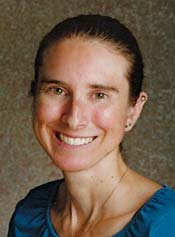 Dr. Margaret (Peggy) Kern is a senior lecturer in the University of Melbourne Graduate School of Education, in the new Centre for Positive Psychology. She received postdoctoral training at the Positive Psychology Center at the University of Pennsylvania. Her research focuses on understanding and measuring healthy functioning, and evaluating sophisticated theories of psychosocial processes underlying health over time. Her work incorporates innovative quantitative methods and interdisciplinary collaboration.
Dr. Margaret (Peggy) Kern is a senior lecturer in the University of Melbourne Graduate School of Education, in the new Centre for Positive Psychology. She received postdoctoral training at the Positive Psychology Center at the University of Pennsylvania. Her research focuses on understanding and measuring healthy functioning, and evaluating sophisticated theories of psychosocial processes underlying health over time. Her work incorporates innovative quantitative methods and interdisciplinary collaboration.
Dr. Kern received a BA from Arizona State University and a masters and PhD from the University of California, Riverside. She is a well-published young scholar, with strong statistical and method skills. She previously spent weeks at the Terman archives, gathering and encoding qualitative information for her doctoral dissertation on physical activity, which used the planned growth curve and survival analyses detailed above. At Penn, she also works with computational linguists to analyze word use in social media.
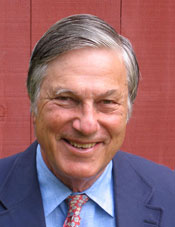 Dr. George E. Vaillant, M.D., a research psychiatrist, is one of the pioneers in the study of adult development. He directed the famous Harvard Study of Adult Development for thirty-five years. He has received numerous awards in psychiatry. His 1977 book, Adaptation to Life, is a classic in the study of adult development. He is author most recently of Triumphs of Experience: The Men of the Harvard Grant Study.
Dr. George E. Vaillant, M.D., a research psychiatrist, is one of the pioneers in the study of adult development. He directed the famous Harvard Study of Adult Development for thirty-five years. He has received numerous awards in psychiatry. His 1977 book, Adaptation to Life, is a classic in the study of adult development. He is author most recently of Triumphs of Experience: The Men of the Harvard Grant Study.
George is well-known for his expertise in the psychology of religious and spiritual issues, including books and articles analyzing humans’ inherent spirituality. In 2009, he (and his work on the Harvard study) was the subject of an influential feature article in The Atlantic Magazine by Joshua Wolf Shenk.
Project 9: Abigail Marsh Biography
Project Title: The Role of Prospective Altruism in Stem Cell Donation
 Principal investigator Abigail Marsh is an Associate Professor of Psychology at Georgetown University. She received her MA and PhD in Social Psychology from Harvard University in 2001 and 2004, respectively, and completed her post-doctoral training in cognitive neuroscience at the National Institute of Mental Health. Her research focuses on the cognitive, emotional, and neural bases of empathy, aggression, and altruism in adults and adolescents. Her recent work has focused on psychosocial and neurobiological variables that distinguish altruistic kidney donors from other adults, funded by the Positive Neuroscience Project at the University of Pennsylvania and the John Templeton Foundation. This work continues her longstanding interest in the biological basis of human altruism, which began with her dissertation work aimed at identifying variables that predict individual differences in altruistic behavior in the laboratory.
Principal investigator Abigail Marsh is an Associate Professor of Psychology at Georgetown University. She received her MA and PhD in Social Psychology from Harvard University in 2001 and 2004, respectively, and completed her post-doctoral training in cognitive neuroscience at the National Institute of Mental Health. Her research focuses on the cognitive, emotional, and neural bases of empathy, aggression, and altruism in adults and adolescents. Her recent work has focused on psychosocial and neurobiological variables that distinguish altruistic kidney donors from other adults, funded by the Positive Neuroscience Project at the University of Pennsylvania and the John Templeton Foundation. This work continues her longstanding interest in the biological basis of human altruism, which began with her dissertation work aimed at identifying variables that predict individual differences in altruistic behavior in the laboratory.
Her work has been published in interdisciplinary journals including Psychological Science, JAMA Psychiatry, American Journal of Psychiatry, Journal of Personality & Social Psychology, and Emotion. At Georgetown University, a Jesuit university dedicated to instructing students to be reflective lifelong learners, responsible and active participants in civic life, and to live generously in service to others, Marsh teaches courses that include Empathy, Altruism, & Aggression and Social & Affective Neuroscience.
Project 10: Samuel McClure and Anthony Wagner Biographies
Project Title: Drawing on the Past to Navigate the Future: Neural, Cognitive, and Affective Mechanisms of Prospection
 Dr. Samuel M. McClure has been studying the brain basis of reward learning and decision making for nearly two decades. He began as a Ph.D. student in Neuroscience at Baylor College of Medicine, where he combined computational modeling with fMRI to show how brain regions associated with the human dopamine system mediate reward learning. In 2003, McClure began a Postdoc in the Psychology Department at Princeton University. His work at Princeton focused on how people evaluate future rewards, and particularly on the role of the prefrontal cortex in this valuation process.
Dr. Samuel M. McClure has been studying the brain basis of reward learning and decision making for nearly two decades. He began as a Ph.D. student in Neuroscience at Baylor College of Medicine, where he combined computational modeling with fMRI to show how brain regions associated with the human dopamine system mediate reward learning. In 2003, McClure began a Postdoc in the Psychology Department at Princeton University. His work at Princeton focused on how people evaluate future rewards, and particularly on the role of the prefrontal cortex in this valuation process.
McClure has been an Assistant Professor in the Psychology Department at Stanford University since 2007 where he directs the Decision Neuroscience Lab. He continues to combine computational modeling, behavioral and neuroimaging experiments to study how planning for the future combines with immediate reward expectation to guide behavior. At Stanford, McClure is affiliated with the Neuroscience Program, the Symbolic Systems Program, the Center for Longevity, and the Stanford Center for Healthy Weight. Through these affiliations McClure applies findings from his laboratory to broader societal problems.
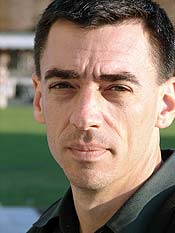 Dr. Anthony D. Wagner is a Professor of Psychology and Neuroscience at Stanford, where he directs the Stanford Memory Laboratory (http://memorylab.stanford.edu/) and is the co-director of the Stanford Center for Cognitive and Neurobiological Imaging (http://cni.stanford.edu/). His research focuses on the psychology and neurobiology of learning, memory, and executive function in healthy individuals and, through collaboration, in clinical populations (schizophrenia; MCI and Alzheimer's disease). His lab uses a variety of imaging techniques, including functional MRI and electroencephalography, to understand how the brain builds and retrieves memories and to examine the processes that enable goal-directed behavior.
Dr. Anthony D. Wagner is a Professor of Psychology and Neuroscience at Stanford, where he directs the Stanford Memory Laboratory (http://memorylab.stanford.edu/) and is the co-director of the Stanford Center for Cognitive and Neurobiological Imaging (http://cni.stanford.edu/). His research focuses on the psychology and neurobiology of learning, memory, and executive function in healthy individuals and, through collaboration, in clinical populations (schizophrenia; MCI and Alzheimer's disease). His lab uses a variety of imaging techniques, including functional MRI and electroencephalography, to understand how the brain builds and retrieves memories and to examine the processes that enable goal-directed behavior.
Wagner received his Ph.D. from Stanford in 1997, was a postdoctoral fellow at Harvard University and at the Massachusetts General Hospital’s brain imaging facility, and was on the faculty at MIT from 2000-2003. In 2003, he returned to the Stanford Psychology Department, as well as the Neurosciences Program, the Symbolic Systems Program, and the Stanford Center for Longevity. In addition to his basic science and translational research, he examines the implications of neuroscience for the law as a member of the MacArthur Foundation's Research Network on Law and Neuroscience.
Project 11: David Rand Biography
Project Title: Promoting Cooperation with Our Future Selves
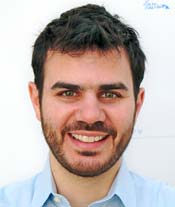 David Rand is an assistant professor of psychology, economics, and management at Yale University, and the director of Yale University’s Human Cooperation Laboratory. He is also a member of the Yale University Cognitive Science Program, and the Yale Institute for Network Science. He received his B.A. in computational biology from Cornell University in 2004 and his Ph.D. in systems biology from Harvard University in 2009, and was a post-doctoral research in Harvard University’s psychology department from 2009 to 2013.
David Rand is an assistant professor of psychology, economics, and management at Yale University, and the director of Yale University’s Human Cooperation Laboratory. He is also a member of the Yale University Cognitive Science Program, and the Yale Institute for Network Science. He received his B.A. in computational biology from Cornell University in 2004 and his Ph.D. in systems biology from Harvard University in 2009, and was a post-doctoral research in Harvard University’s psychology department from 2009 to 2013.
David’s research combines a range of theoretical and experimental methods in an effort to understand human behavior and decision-making. He is particular interested in explaining the high levels of cooperation that typify human societies, and to uncovering ways to promote cooperation in situations where it is lacking.
David’s work has been published in journals including Nature, Science, Proceedings of the National Academy of Science, American Economic Review, Psychological Science, and the Journal of Experimental Psychology: General, and has received widespread attention from a range of media outlets, including NPR, the BBC, The Economist, Scientific American, Wired, New Scientist, London’s Daily Telegraph, The Washington Post, Rolling Stone, Discover, Financial Times, and the Los Angeles Times. He has also written popular press articles for Wired, New Scientist, and the Psychological Observer. He was named to Wired magazine’s Smart List 2012 of “50 people who will change the world,” and chosen as a 2012 PopTech Science Fellow.
Project 12: Jonathan Smallwood Biography
Project Title: Understanding the Uniqueness of Prospective Thought in Psychological and Neural Terms
Dr. Jonathan Smallwood’s scientific career has been devoted to understanding how the mind generates thoughts that do not arise from current perceptual input (such as when we imagine the future) and exploring the role these experiences play in our daily lives. Common examples of these experiences include mind-wandering and daydreaming. Jonathan’s work has shown that a primary aspect of these experiences is a focus on the future, suggesting that this is an important way that individuals engage in the act of prospection. He began studying these experiences during his PhD, which was completed in November 2002, and since then has worked as a cognitive psychologist in the following international institutions: the University of British Columbia (UBC), Vancouver, Canada; The University of California, Santa Barbara, (UCSB); and the Max Planck Institute of Human Cognitive Brain Science’s in Leipzig, Germany. He is currently a Reader in the Psychology Department / York Neuroimaging Centre at the University of York, UK, where he manages a group of three outstanding PhD students and several masters students.
In his work Jonathan uses state-of-the-art tools of both psychology (such as experience sampling) and cognitive neuroscience (such as functional magnetic resonance imaging) to develop theoretical accounts of how the mind escapes from the constraints of the moment with the aim of ultimately producing a unified account of both the mental and experiential domains.
Project 13: Bethany Teachman Biography
Project Title: Adapting Cognitive Bias Modification to Train Healthy Prospection
 Bethany A. Teachman is a Professor of Psychology and the Director of Clinical Training at the University of Virginia. She received her Ph.D. from Yale University and B.A. from the University of British Columbia. Her research focuses on biases in cognitive processing that contribute to the development and maintenance of anxiety disorders and other forms of emotion dysregulation, with a particular interest in investigating how automatic cognitive processes can be modified. In addition, she teaches undergraduate and graduate level courses in psychopathology, and trains graduate students learning to do therapy. Dr. Teachman is a licensed clinical psychologist with over 100 publications, including the books Treatment Planning in Psychotherapy: Taking the Guesswork Out of Clinical Care (2002, Guilford Press) and Helping Your Child Overcome an Eating Disorder: What You Can Do at Home (2003,New Harbinger). Dr. Teachman is associate editor for the journal Perspectives on Psychological Science, a Fellow of the Association for Psychological Science, and winner of the 2012 American Psychological Association (APA) Distinguished Scientific Award for Early Career Contribution to Psychology and the 2014 Association for Behavioral and Cognitive Therapies Outstanding Mentor Award. She is Director of the website Project Implicit Mental Health, and the current President of the Society for a Science of Clinical Psychology. Lab Webpage: www.teachman.org
Bethany A. Teachman is a Professor of Psychology and the Director of Clinical Training at the University of Virginia. She received her Ph.D. from Yale University and B.A. from the University of British Columbia. Her research focuses on biases in cognitive processing that contribute to the development and maintenance of anxiety disorders and other forms of emotion dysregulation, with a particular interest in investigating how automatic cognitive processes can be modified. In addition, she teaches undergraduate and graduate level courses in psychopathology, and trains graduate students learning to do therapy. Dr. Teachman is a licensed clinical psychologist with over 100 publications, including the books Treatment Planning in Psychotherapy: Taking the Guesswork Out of Clinical Care (2002, Guilford Press) and Helping Your Child Overcome an Eating Disorder: What You Can Do at Home (2003,New Harbinger). Dr. Teachman is associate editor for the journal Perspectives on Psychological Science, a Fellow of the Association for Psychological Science, and winner of the 2012 American Psychological Association (APA) Distinguished Scientific Award for Early Career Contribution to Psychology and the 2014 Association for Behavioral and Cognitive Therapies Outstanding Mentor Award. She is Director of the website Project Implicit Mental Health, and the current President of the Society for a Science of Clinical Psychology. Lab Webpage: www.teachman.org
Project 14: Leaf Van Boven and Eugene Caruso Biographies
Project Title: The Phenomenological Foundations of Prospective Psychological Distance
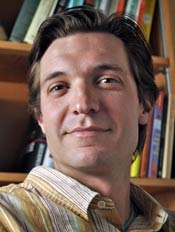 Leaf Van Boven is Professor of Psychology and Neuroscience at the University of Colorado Boulder. Van Boven is Director of the Center for Research on Judgment and Policy, director of the Emotion, Decision, Judgment, and Intuition (EDJI) lab, and Associate Editor of the Journal of Personality and Social Psychology. Professor Van Boven has received multiple grants from the National Science Foundation and was awarded the outstanding dissertation research award in Positive Psychology for his work demonstrating that investing in life experiences makes people happier than investing in material possessions—a finding that has been widely replicated and used to help many people make better life decisions. Broadly, Professor Van Boven’s research examines the interrelation of emotion, judgment, and decision-making in people’s everyday lives. He is particularly interested in how people bridge the gap between their immediate experiences, their temporally distal experiences, and other people’s experiences. Professor Van Boven’s research has been widely covered by the popular media. Beyond his research on experiential versus material investments, he is also known for his research indicating that people underestimate the power of emotions to shape their own and other people’s behavior, (as discussed in an interview with Colorado Public Radio), and, more recently, for research suggesting that people exaggerate political polarization in America, as described in several Op-Ed pieces on the topic of political psychology, appearing in the New York Times, the Denver Post, and NPR’s Academic Minute.
Leaf Van Boven is Professor of Psychology and Neuroscience at the University of Colorado Boulder. Van Boven is Director of the Center for Research on Judgment and Policy, director of the Emotion, Decision, Judgment, and Intuition (EDJI) lab, and Associate Editor of the Journal of Personality and Social Psychology. Professor Van Boven has received multiple grants from the National Science Foundation and was awarded the outstanding dissertation research award in Positive Psychology for his work demonstrating that investing in life experiences makes people happier than investing in material possessions—a finding that has been widely replicated and used to help many people make better life decisions. Broadly, Professor Van Boven’s research examines the interrelation of emotion, judgment, and decision-making in people’s everyday lives. He is particularly interested in how people bridge the gap between their immediate experiences, their temporally distal experiences, and other people’s experiences. Professor Van Boven’s research has been widely covered by the popular media. Beyond his research on experiential versus material investments, he is also known for his research indicating that people underestimate the power of emotions to shape their own and other people’s behavior, (as discussed in an interview with Colorado Public Radio), and, more recently, for research suggesting that people exaggerate political polarization in America, as described in several Op-Ed pieces on the topic of political psychology, appearing in the New York Times, the Denver Post, and NPR’s Academic Minute.
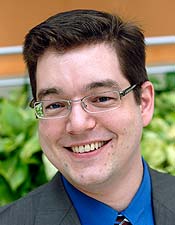 Eugene Caruso is an Associate Professor of Behavioral Science at The University of Chicago Booth School of Business. Professor Caruso’s research aims to understand the abilities that enable people to transcend their present circumstances to consider situations and perspectives different from their current one. This research spans two broad areas: temporal perspective taking (understanding other times) and social perspective taking (understanding other minds). People can move beyond their present temporal perspective to remember past events and to imagine future ones, and can move beyond their own personal perspective to understand what other people are thinking, feeling, and doing. Inferences about other times and other people are challenging because these perspectives are not immediately at hand. Yet many consequential judgments and decisions rely critically on just such inferences. Professor Caruso’s research explores the basic psychological processes that guide these types of judgments, with a particular focus on the moral and ethical consequences that result when people consider times other than the present and people other than the self. He explores the implications that this work has for various populations, from individuals attempting collaboration with others to legal systems designed to render impartial judgments.
Eugene Caruso is an Associate Professor of Behavioral Science at The University of Chicago Booth School of Business. Professor Caruso’s research aims to understand the abilities that enable people to transcend their present circumstances to consider situations and perspectives different from their current one. This research spans two broad areas: temporal perspective taking (understanding other times) and social perspective taking (understanding other minds). People can move beyond their present temporal perspective to remember past events and to imagine future ones, and can move beyond their own personal perspective to understand what other people are thinking, feeling, and doing. Inferences about other times and other people are challenging because these perspectives are not immediately at hand. Yet many consequential judgments and decisions rely critically on just such inferences. Professor Caruso’s research explores the basic psychological processes that guide these types of judgments, with a particular focus on the moral and ethical consequences that result when people consider times other than the present and people other than the self. He explores the implications that this work has for various populations, from individuals attempting collaboration with others to legal systems designed to render impartial judgments.
Project 15: Matthijs van der Meer Biography
Project Title: Hippocampal Sequences as Prospection
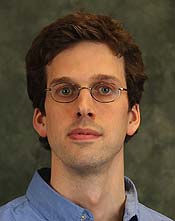 Dr. Matthijs (Matt) van der Meer is Assistant Professor in the Department of Psychological and Brain Sciences at Dartmouth College (starting 01/2015). His research interests center on the interplay between memory and decision-making, in particular how neural circuits generate predictions about possible futures that can inform deliberation between alternative options. Dr. van der Meer received a M.Sc. in Informatics and a Ph.D. in Neuroinformatics from the University of Edinburgh (United Kingdom). Following a post-doctoral fellowship in Neuroscience at the University of Minnesota with Prof. A. David Redish, Dr. van der Meer established his laboratory at the University of Waterloo, where he held a Canada Research Chair in Neuroscience and an Ontario Early Researcher Award. Dr. van der Meer is currently an HFSP Young Investigator.
Dr. Matthijs (Matt) van der Meer is Assistant Professor in the Department of Psychological and Brain Sciences at Dartmouth College (starting 01/2015). His research interests center on the interplay between memory and decision-making, in particular how neural circuits generate predictions about possible futures that can inform deliberation between alternative options. Dr. van der Meer received a M.Sc. in Informatics and a Ph.D. in Neuroinformatics from the University of Edinburgh (United Kingdom). Following a post-doctoral fellowship in Neuroscience at the University of Minnesota with Prof. A. David Redish, Dr. van der Meer established his laboratory at the University of Waterloo, where he held a Canada Research Chair in Neuroscience and an Ontario Early Researcher Award. Dr. van der Meer is currently an HFSP Young Investigator.
Project 16: Felix Warneken Biography
Project Title: Prospection and the Origins of Prosociality
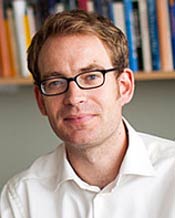 Dr. Felix Warneken is an Associate Professor and Director of the Social Cognitive Development Group in the Psychology Department at Harvard University. Trained as a developmental and comparative psychologist, he conducts research on cooperation and social cognitive development in children and great apes. He studied in Germany and the United States, receiving his doctoral degree from the Universität Leipzig while working at the Max Planck Institute for Evolutionary Anthropology as a graduate student and postdoctoral fellow. He joined the Harvard Psychology Department in 2009.
Dr. Felix Warneken is an Associate Professor and Director of the Social Cognitive Development Group in the Psychology Department at Harvard University. Trained as a developmental and comparative psychologist, he conducts research on cooperation and social cognitive development in children and great apes. He studied in Germany and the United States, receiving his doctoral degree from the Universität Leipzig while working at the Max Planck Institute for Evolutionary Anthropology as a graduate student and postdoctoral fellow. He joined the Harvard Psychology Department in 2009.
His most significant contributions have been on the origins of cooperative behaviors in young children and chimpanzees. His study demonstrating altruistic helping in children and chimpanzees was named one of the 100 most important science stories in 2007 by Discover Magazine. Dr. Warneken has received several awards, most recently an Early Career Research Award from the Society for Research in Child Development, the Janet Taylor Spence Award for Transformative Early Career Contributions from the American Psychological Society, and a National Science Foundation CAREER award, all in 2013. His research has received support from the European Commission, NSF, and the John Templeton Foundation.
Project 17: Phillip Wolff, Eugene Agichtein, and Bridget Copley Biographies
Project Title: Linguistic Hints to Causal Models of the Future
 Dr. Phillip Wolff is an Associate Professor in Psychology and Director of the Program in Linguistics at Emory University. Phillip’s research focuses on the representation and organization of relational concepts and their role in higher-order reasoning as well as on the interface between language and cognition. He has conducted research on the semantics of verbs and prepositions and how cross-linguistic differences in meaning might reflect differences in thought, including differences in causal reasoning, event segmentation, and object perception.
Dr. Phillip Wolff is an Associate Professor in Psychology and Director of the Program in Linguistics at Emory University. Phillip’s research focuses on the representation and organization of relational concepts and their role in higher-order reasoning as well as on the interface between language and cognition. He has conducted research on the semantics of verbs and prepositions and how cross-linguistic differences in meaning might reflect differences in thought, including differences in causal reasoning, event segmentation, and object perception.
Dr. Wolff’s research involves a range of methodologies, including behavior experimentation, computational linguistics, computer visualization, computational modeling, and cross-linguistic comparisons. Dr. Wolff has co-edited three books, including one with Dr. Barbara Malt entitled Words and the Mind which examines the interface of language and thought across languages. In addition to serving on several editorial boards and serving as the Director of the Program in Cognition and Development, Dr. Wolff has served as associate editor of the journal Cognitive Science and has served as faculty at the 2007 Summer Institute of Linguistics at Stanford University. He has over 2100 citations total in Google Scholar as of June 2014.
Dr. Eugene Agichtein is an Associate Professor in the Math & CS department at Emory University, where he leads the Emory Intelligent Information Access Laboratory (IR Lab). Eugene’s laboratory works on mining searcher behavior and interaction data for improving web search, modeling social content creation and sharing, and applications to medicine and life sciences. Dr. Agichtein received a Ph.D. in Computer Science from Columbia University, and did a Postdoc at Microsoft Research. In collaboration with colleagues and students, Eugene has published over 90 articles on web search, information retrieval, and web and data mining. Dr. Agichtein is an A. P. Sloan research fellow, and was a member of the 2011 DARPA Computer Science Study group. Dr. Agichtein’s work has been supported by DARPA, NSF, NIH, Microsoft, Google, and Yahoo!, and has been recognized with multiple awards, including the “best paper awards” at WSDM 2014, SIGIR 2011, SIGMOD 2006, and ICDE 2003, and most recently by the 2013 Karen Sparck Jones (KSJ) Award from the British Computer Society.
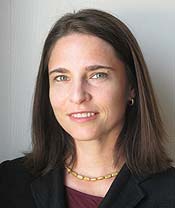 Dr. Bridget Copley is a Senior Researcher at the laboratory Structures Formelles du Langage, jointly affiliated with the Centre Nationale de la Recherche Scientifique and the Université Paris. Working from a formal semantic perspective, Dr. Copley is particularly interested in how we talk about what happens next, focusing on future reference, conditionals, and possibilities, as well as on the linguistic expression of related phenomena such as causation, agency, ability, and dispositions. Dr. Copley’s research takes the view that meaning is contributed both at a generative, syntax-visible, semantic level (i.e., logical form), as well as at a non-generative, conceptual level, and that the division of labor between these levels is testable using the methods of syntactic theory, model-theoretic semantics, and cognitive psychology. Her work thus provides an important and much-needed bridge between recent advances made at the syntax- semantics interface and the growing domain of research on the semantics-cognition interface. Dr. Copley received her Ph.D. in Linguistics and Philosophy in 2002 from the Massachusetts Institute of Technology, and reviews for many top journals and conferences in the field of Linguistics. She is the author of The Semantics of the Future (Routledge), and editor (with Dr. Fabienne Martin) of the upcoming volume Causation in Grammatical Structures (Oxford).
Dr. Bridget Copley is a Senior Researcher at the laboratory Structures Formelles du Langage, jointly affiliated with the Centre Nationale de la Recherche Scientifique and the Université Paris. Working from a formal semantic perspective, Dr. Copley is particularly interested in how we talk about what happens next, focusing on future reference, conditionals, and possibilities, as well as on the linguistic expression of related phenomena such as causation, agency, ability, and dispositions. Dr. Copley’s research takes the view that meaning is contributed both at a generative, syntax-visible, semantic level (i.e., logical form), as well as at a non-generative, conceptual level, and that the division of labor between these levels is testable using the methods of syntactic theory, model-theoretic semantics, and cognitive psychology. Her work thus provides an important and much-needed bridge between recent advances made at the syntax- semantics interface and the growing domain of research on the semantics-cognition interface. Dr. Copley received her Ph.D. in Linguistics and Philosophy in 2002 from the Massachusetts Institute of Technology, and reviews for many top journals and conferences in the field of Linguistics. She is the author of The Semantics of the Future (Routledge), and editor (with Dr. Fabienne Martin) of the upcoming volume Causation in Grammatical Structures (Oxford).
Project 18: Liane Young, Brendan Gaesser, and Elizabeth Kensinger Biographies
Project Title: Harnessing Episodic Simulation to Facilitate Prosociality
 Dr. Liane Young is an Assistant Professor of Psychology at Boston College. She studies the psychological and neurological basis of human moral judgment. Dr. Young's research employs methods of social psychology and cognitive neuroscience, including functional magnetic resonance imaging (fMRI) and examination of patient populations with selective cognitive deficits (e.g., psychopathy, autism). Her research, published in journals such as the Proceedings of the National Academy of Sciences, Nature, and Psychological Science, has been featured in The Boston Globe, NPR, and CNN. Dr. Young received her B.A. in Philosophy in 2004 and her Ph.D. in Psychology at Harvard University in 2008. She completed her post-doctoral training in the Brain and Cognitive Sciences Department at MIT, where she was also a visiting scholar in the Philosophy Department.
Dr. Liane Young is an Assistant Professor of Psychology at Boston College. She studies the psychological and neurological basis of human moral judgment. Dr. Young's research employs methods of social psychology and cognitive neuroscience, including functional magnetic resonance imaging (fMRI) and examination of patient populations with selective cognitive deficits (e.g., psychopathy, autism). Her research, published in journals such as the Proceedings of the National Academy of Sciences, Nature, and Psychological Science, has been featured in The Boston Globe, NPR, and CNN. Dr. Young received her B.A. in Philosophy in 2004 and her Ph.D. in Psychology at Harvard University in 2008. She completed her post-doctoral training in the Brain and Cognitive Sciences Department at MIT, where she was also a visiting scholar in the Philosophy Department.
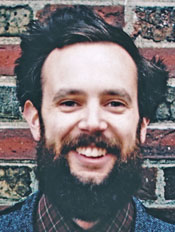 Dr. Brendan Gaesser has published work on episodic simulation in Proceedings of the National Academy of Sciences, Hippocampus, and Journal of Experimental Psychology: Learning, Memory, and Cognition. During his graduate training at Harvard University, he worked with Dr. Daniel Schacter receiving a strong background in the cognitive neuroscience of episodic simulation, memory, and aging using behavioral and fMRI methods. Dr. Gaesser’s interests focus on two distinct, though not unrelated, lines of investigation. The first line examines the role of the hippocampus and underlying component processes in constructing future imagined events (i.e., episodic simulations). The second line begins to explore the relationship between episodic simulation, memory, and empathic responses. While initially developing ideas on the role of episodic processes in facilitating empathy, he wrote a single-author review article that will serve as the springboard for his future work (Gaesser, Frontiers in Psychology, 2013). Dr. Gaesser received his B.A. in Psychology from MCLA in 2007 and his Ph.D. in Psychology from Harvard University in 2014. As an independent investigator, he aims to develop a research program that elucidates the cognitive and neural relationship between these intertwined processes and apply this knowledge to facilitate socially desirable behavior that promotes mental health.
Dr. Brendan Gaesser has published work on episodic simulation in Proceedings of the National Academy of Sciences, Hippocampus, and Journal of Experimental Psychology: Learning, Memory, and Cognition. During his graduate training at Harvard University, he worked with Dr. Daniel Schacter receiving a strong background in the cognitive neuroscience of episodic simulation, memory, and aging using behavioral and fMRI methods. Dr. Gaesser’s interests focus on two distinct, though not unrelated, lines of investigation. The first line examines the role of the hippocampus and underlying component processes in constructing future imagined events (i.e., episodic simulations). The second line begins to explore the relationship between episodic simulation, memory, and empathic responses. While initially developing ideas on the role of episodic processes in facilitating empathy, he wrote a single-author review article that will serve as the springboard for his future work (Gaesser, Frontiers in Psychology, 2013). Dr. Gaesser received his B.A. in Psychology from MCLA in 2007 and his Ph.D. in Psychology from Harvard University in 2014. As an independent investigator, he aims to develop a research program that elucidates the cognitive and neural relationship between these intertwined processes and apply this knowledge to facilitate socially desirable behavior that promotes mental health.
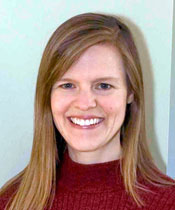 Dr. Elizabeth Kensinger is Professor of Psychology at Boston College, where she has directed the Cognitive and Affective Neuroscience laboratory since 2006. She studies the cognitive and neural processes that give rise to emotional memories. She has a particular interest in understanding why emotional memories feel subjectively vivid and in elucidating the types of details that are remembered about emotional events, and the factors that influence which details are remembered. Her research employs the methods of cognitive neuroscience and biopsychology, including fMRI, EEG, eyetracking, polysomnography, psychophysiology, and hormonal assays. Her research has been published in journals such as the Journal of Neuroscience, Journal of Cognitive Neuroscience, and Cerebral Cortex, and she is the author of the book Emotional Memory Across the Adult Lifespan (Psychology Press, 2009). Dr. Kensinger received her B.A. in Psychology and Biology from Harvard University in 1998 and her Ph.D. in Neuroscience from MIT in 2003. Prior to joining the faculty of Boston College, she completed her post-doctoral training in Radiology at the Massachusetts General Hospital and in Psychology at Harvard University.
Dr. Elizabeth Kensinger is Professor of Psychology at Boston College, where she has directed the Cognitive and Affective Neuroscience laboratory since 2006. She studies the cognitive and neural processes that give rise to emotional memories. She has a particular interest in understanding why emotional memories feel subjectively vivid and in elucidating the types of details that are remembered about emotional events, and the factors that influence which details are remembered. Her research employs the methods of cognitive neuroscience and biopsychology, including fMRI, EEG, eyetracking, polysomnography, psychophysiology, and hormonal assays. Her research has been published in journals such as the Journal of Neuroscience, Journal of Cognitive Neuroscience, and Cerebral Cortex, and she is the author of the book Emotional Memory Across the Adult Lifespan (Psychology Press, 2009). Dr. Kensinger received her B.A. in Psychology and Biology from Harvard University in 1998 and her Ph.D. in Neuroscience from MIT in 2003. Prior to joining the faculty of Boston College, she completed her post-doctoral training in Radiology at the Massachusetts General Hospital and in Psychology at Harvard University.
